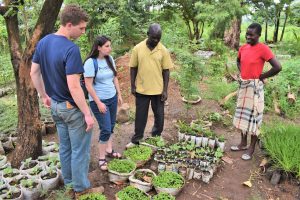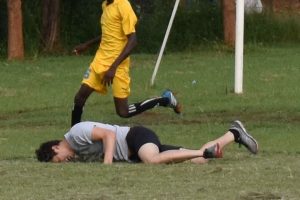Kijenzi Team Makes Friends with Local Artisan
— May 22nd, 2018 – Kisumu, Kenya
— Author: Noah Kozminski
On recreational trip, some members of the Kijenzi team pay a visit to a local Maasai market. The Maasai, a local ethnic group, have maintained much of their traditional lifestyle this past century, with the notable addition of selling art to tourists. In the market, at the last stall on the left, the team meets Kennedy Nyakawa, a local artisan specializing in hand-carved soapstone sculptures. The students and artisan hit it off, and after speaking at length, they are invited for tea at his home.
The residence is a rural farmstead, a traditional mud-brick house surrounded by crops and livestock; Kennedy and his family grow maze, plantains and avocadoes, as well raising chickens and a cow. The group is treated to exceptional hospitality — including tea made with fresh milk, chapati, and chicken — a meal Kennedy says his family eats only rarely. With the abundance of their farm, the family has a wealth of material resources, which they have been transmuting into economic wealth to support Kennedy’s son Simon’s education. After graduating, Simon spent a year helping his father run the art stall in the Maasai market.
Along with tea, the visiting students get to see soapstone collection and carving first-hand. “It was incredible to see the process from start to finish,” says Dan Kats. Getting to visit a mud brick house and eat food prepared in an enclosed, smoke-filled kitchen is also eye-opening. “It shines a whole new light on the problems we’ve been talking about the whole semester.”












You must be logged in to post a comment.